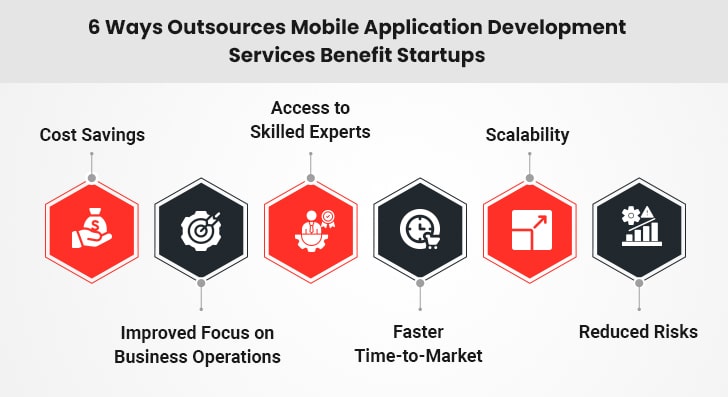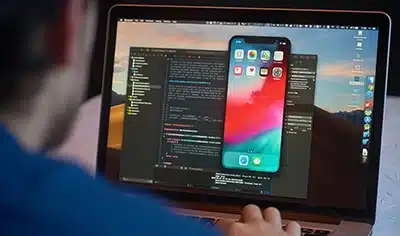The ubiquity of mobile devices has nudged businesses into building top-tier applications to bolster their reach and revenue. Every year, hundreds of startups enter the app development market to deliver exceptional products and prove their worth. However, for these startups, the path to success is paved with a multitude of challenges. Limited budgets, time constraints, and a shortage of specialized experts prevent them from achieving their goals. This is where outsourcing helps. Partnering with an experienced mobile app development company enables startup founders to bring their ideas to fruition faster than the competition. With access to a complete suite of experts, every aspect of the development process is implemented effortlessly while eradicating the hassle of permanent hiring.

In this article, we’ll cover how outsourced mobile application development services benefit startups. We’ll also see how startups can successfully outsource their projects while avoiding potential pitfalls.
Why Are Outsourced Mobile Application Development Services Particularly Beneficial for Startups?

When kickstarting app development, startups have two paths to choose from—build an in-house development team or delegate the project to an external team. While the outcome may be similar in both scenarios, the investment in the form of time and resources varies remarkably.
In-house mobile app development involves considerably more resources. This is because you need to recruit tech experts, invest in IT infrastructure, rent workspace, pay compensation, and other benefits. Outsourcing allows startup businesses to pass these responsibilities to a trusted vendor. With an external party taking care of developer qualification, project management, and task deadlines, you are free to focus on high-growth activities.
Here are the 6 key benefits your startup may realize with outsourced app development services:
1. Cost Savings
In-house app development may dent your startup’s IT budget due to the investment involved. Delegating development to an external party is often cheaper than building your own team. This is because you don’t need to purchase new equipment or rent office space. No need to onboard and train new talent either.
Also, depending on the geographical location of the outsourced team, you may be able to achieve cost savings of up to 20-70%. Today, the average salary of a developer in the USA is around $108,693 per year or $52 per hour. If you decide to outsource work to developers in locations like India, it’ll cost you just $25 per hour. For locations such as Latin America, it can be as low as $28 per hour.
2. Improved Focus on Business Operations
Working with a mobile app development company allows you to delegate tasks that would have otherwise required your time and attention. Once you have initiated a contract with a vendor, your responsibilities are limited to overseeing the progress and providing feedback. Most vendors have a dedicated project manager to monitor all project-related work on your behalf. Thus, you can allocate time to activities that cannot be outsourced. These may include strategy building, raising funds, and forging new alliances.
3. Access to Skilled Experts
The technology industry is experiencing a talent crisis. Hiring individuals with expertise in highly specialized domains (e.g., cybersecurity or augmented reality) has become difficult. Most companies struggle to fill IT vacancies. Outsourcing mitigates such challenges. This is because you get access to a pool of pre-vetted, experienced professionals at relatively low prices. Besides, you don’t need to limit yourself to a specific location—you may hire professionals from anywhere in the world to work on your development project.
4. Faster Time-to-Market
Time is of the essence in today’s world where change happens at break-neck speed. Even a few days of difference may impact how well your app is received in the marketplace. Introducing a new product to the market allows your business to gain brand recognition. It also helps you tap into a wide consumer base and create a strong first impression.
Outsourcing custom mobile app development to a dedicated team allows you to move from proof-of-concept (PoC) to product launch much faster. This is because these teams are typically more efficient and conversant with a broad range of frameworks and technologies.
Foolproof Ways to Build Successful Mobile Applications Across Verticals
5. Scalability
The requirements in an app development project may change over time. For some reason, if you decide to expedite the launch or add unique features to the app, you’ll need a larger headcount to handle the same. Unlike in-house development, outsourcing provides a great deal of flexibility. It allows startups and small businesses to scale up their teams without a hitch. This way, changes in the scope of work are easily managed without affecting the project timeline.
6. Reduced Risks
Professional development companies follow established protocols when building an app. They see to it that your application adheres to local data protection laws. Also, most of them have standardized processes for testing and quality control. This makes sure your product remains free of bugs and other vulnerabilities.
Outsourcing Mobile App Development: A Step-by-Step Approach
Now that we’ve discussed the benefits of outsourced app development, let’s look at the approach that should be followed to ensure a successful, high-performing app:
I. Assess Project Requirements
To begin with, think through the requirements of your project. Decide on the type of app you want to develop, what problems it will solve, and how it will drive value for your business. Once this is taken care of, work on building a list of features and functionalities for your application. In addition to standard features (e.g., user registration, sign-in), try and include features that will set your product apart.
An essential aspect that needs to be on your agenda at this stage is budgeting. The project’s budget will dictate your outsourcing options as well as the functionality of your app. Hence, it’s important to work on it in the very beginning.
II. Search for Potential Vendors
When looking for reliable tech specialists, counting on Google search alone may not be a good idea. In addition to Google, leverage talent platforms like Clutch and GoodFirms to augment your search.
To shortlist suitable vendors from a long list of prospects, filter the vendors based on the technologies you are interested in. Another criterion that you should consider at this stage is geography or time zone. Accordingly, you may classify vendors into three categories—onshore (within the same country), nearshore (in a nearby country with a similar time zone), or offshore (in a far-off location with significant time zone differences).
Although onshore vendors may cost you more, they are perfect when it comes to communication and cultural fit. In contrast, the offshore ones may help you cut down on costs but will demand some coordination on your part. This is because you may need to adjust the timings of meetings according to their local time zones.
III. Carefully Evaluate Shortlisted Vendors
Once you’ve shortlisted vendors, it’s time to vet their technical proficiency and suitability for your project. Here are a few essential factors to consider:
- Portfolio: When going through their portfolio, see if they have handled similar projects in the past. Assess their capabilities based on the practical experience they have in the niche you are targeting.
- Technology Stack: Their teams should be proficient in the programming languages and frameworks needed for the app.
- Testimonials: Gather feedback on the vendor by looking for unbiased reviews on the web. If needed, reach out to their past or existing clients to get information on specific aspects of their work.
IV. Choose a Suitable Engagement Model
After selecting a development partner, choose an appropriate engagement model depending on the level of involvement you seek. Here are a few options to consider:
- Dedicated Team: Here, the vendor provides a remote development team along with a project manager to work on the assigned tasks. This model is great for long-term projects where requirements and scope evolve with time.
- Project-Based Outsourcing: In this model, a vendor is hired to work on a development project with clear-cut deliverables and fixed budgets. Project-based outsourcing is apt for short-term projects with finite timelines.
- Staff Augmentation: Here, additional tech experts are hired to augment an existing in-house team of developers. The client maintains a great deal of control over various aspects of the project. They closely monitor the project’s progress and get to decide what to prioritize and when.
V. Select an Appropriate Payment Model
Once you’ve decided on the outsourcing model, choose a suitable payment model for the app development project. Here are two commonly used models:
- Fixed Price: As the name suggests, the client agrees to pay a fixed sum to the vendor before the project begins. Fixed price contracts are common in relatively simple development projects where the scope and deliverables are well known, for example, building an MVP (minimum viable product) to validate an app idea.
- Time and Material: This model is used when it is difficult to determine the amount of work that may be needed in a project. The total cost isn’t agreed upon at the outset, as it may depend on the number of hours invested in the project, and the resources used to deliver it.
VI. Establish Clear Communication
After selecting a vendor, it is vital to set up protocols to ensure clear, unambiguous communication between the two parties. Decide on which platforms will be used for project management and how progress will be tracked and communicated to the stakeholders. Also, establish a process for resolving conflicts or issues that may come up during development.
VII. Track Project Progress
To make sure everything goes as planned, it is crucial to track the progress of the mobile app development project. A well-documented contingency plan may help deal with unforeseen events or issues that may arise in the course of development.
Reimagining Possibilities: The Influence of Emerging Technologies on App Development
How Much Do Outsourced Mobile Application Development Services Cost?
There is no straight answer to how much outsourced app development may cost. The cost is influenced by many factors, including the scope of work, the chosen technology stack, the level of complexity involved, and the functionality desired. Depending on these factors, the cost of custom app development can vary anywhere between $30,000 and $300,000.
When building an app through outsourcing, you can try to figure out the costs by answering the following questions:
- What kind of app are you looking to develop?
- How fast do you want your app to get to the market?
- Do you need tech experts with specialized, highly sought-after skills?
- Are you seeking post-development support as well? If so, for how long?
- Is your scope of work fixed or subject to change?
- Where is your development team located?
- Which engagement and payment model have you decided to follow?
It’s essential to note that the hourly rates charged by development teams differ significantly across regions. This means developers in geographies such as Vietnam may command a price of $20-40 per hour. In contrast, tech experts in developed nations like the USA may require you to shell out up to $70 an hour.
Fuel Business Transformation with Outsourced App Development
In this age when mobile apps have touched nearly all aspects of our lives, a high-impact app may help your startup stand out in competitive markets. Outsourced app development allows small businesses to access a team of professionals who dedicate their complete attention to building your product.
However, finding a suitable vendor is no easy feat, especially when you operate with limited capital. Experienced technology service providers like Damco prove useful here. Our team of vetted experts works assiduously on your mobile app development projects. Damco’s proven expertise helps add tremendous value to your product. We help your business launch innovative products to the market swiftly and cost-efficiently. Our post-development support and maintenance allow you to maintain an edge in the market long after the launch and pivot as needed.






